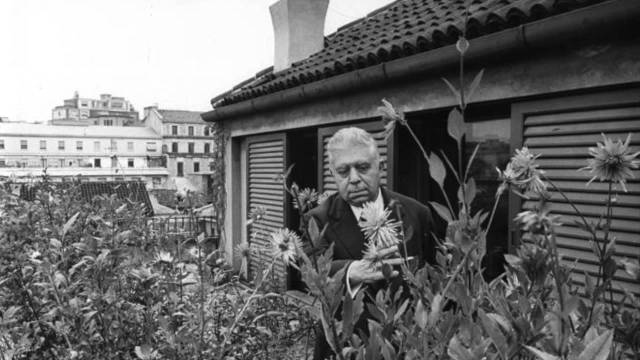Today, as is our custom, we got up at six o’clock and, after a quick breakfast, set off for a walk in the early morning freshness. As we walked up the mountain road towards the picturesque village of Pracchiola, constantly surrounded by the strident screeching of cicadas, I gazed up at the intense blue cloudless sky. The dazzling sunlight drew perfectly defined shadows on the road, and the stone walls that enclose vineyards and vegetable plots, now abandoned, brought to mind the words of a poem by the poet Eugenio Montale (Genova 1896 – Milano 1981). Meriggiare is one of his most famous compositions and without a doubt my favourite.

Eugenio Montale
I love the way in which the poet perfectly renders the sense of tiredness and idleness brought on by the heat that causes you to observe the most minute details of nature, such as the lines of busy ants that continually form and break up as they follow the cracks in the walls. The poem’s title, Meriggiare, is a verb that literally means ‘to pass the hottest hours of the day in a shady outdoor place’, how lovely to have one word that expresses a whole phrase! I also like the succinctness of Montale’s language, which is able to convey in a few simple words the intensity of light and heat, e.g.: il rovente muro d’orto (the scorching garden wall).
However, the thing I love the most about this poem is the way in which Montale uses whole strings of alliterations and harsh, almost unpronounceable syllables, that recreate the sensation of tiredness you feel as you stumble under the hot sun:
Meriggiare di Eugenio Montale
Meriggiare pallido e assorto
presso un rovente muro d’orto,
ascoltare tra i pruni e gli sterpi
schiocchi di merli, frusci di serpi.
Nelle crepe del suolo o su la veccia
spiar le file di rosse formiche
ch’ora si rompono ed ora s’intrecciano
a sommo di minuscole biche.
Osservare tra frondi il palpitare
lontano di scaglie di mare
mentre si levano tremuli scricchi
di cicale dai calvi picchi.
E andando nel sole che abbaglia
sentire con triste meraviglia
com’è tutta la vita e il suo travaglio
in questo seguitare una muraglia
che ha in cima cocci aguzzi di bottiglia.
–
Meriggiare by Eugenio Montale
interpreted by Millicent Bell (Professor Emerita of English at Boston University)
To slump at noon thought-sick and pale
under the scorching garden wall,
to hear a snake scrape past, the blackbirds creak
in the dry thorn thicket, the brushwood brake.
Between tufts of vetch, in the cracks of the ground
to spy out the ants’ long lines of march;
now they reach the top of a crumb-sized mound,
the lines break, they stumble into a ditch.
To observe between the leaves the pulse
beneath the sea’s scaly skin,
while from the dry cliffs the cicada calls
like a knife on the grinder’s stone.
And going into the sun’s blaze
once more, to feel, with sad surprise
how all life and its battles
is in this walk alongside a wall
topped with sharp bits of glass from broken bottles.






Comments:
Michelle:
If you had a like button I would have pushed it.
This is just the verb I need for my Italian study group tomorrow.
Grazie!
Michelle
Geoff:
@Michelle Now that’s a great idea … a like button! 🙂
Joseph T. Madawela:
great source for new words elegantly expressed.
Michelle:
I have challenged my friends in my Italian study group to write a sentence using the verb “meriggiare”. It’s hot enough here that they shouldn’t have any trouble.
Grazie ancora!
Geoff:
@Michelle Brava! Ci piacerebbe vedere i risultati.
Saluti da Geoff e Serena
nury:
how can i join a study group?
Geoff:
@nury Mi dispiace ma non ne ho la minima idea! Dove abita lei?
Saluti da Geoff